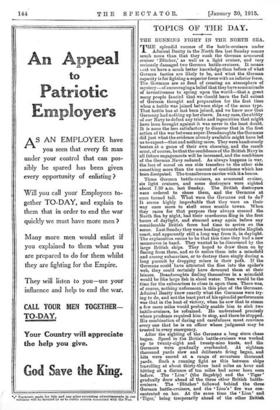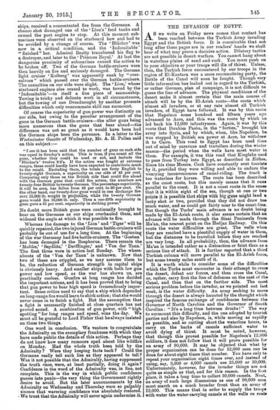TOPICS OF THE DAY.
THE RUNNING FIGHT IN THE NORTH SEA.
THEsplendid success of the battle-cruisers under Admiral Beatty in the North Sea last Sunday means much more than that they sunk the German armoured cruiser 'Blucher,' as well as a light cruiser, and very seriously damaged two German battle-cruisers. It means unit we have a much better knowledge than before of what German tactics are likely to be, and what the German capacity is for fighting a superior force with an inferior force. The Germans are so fond of creating an atmosphere of mystery—of encouraging a belief that they have some miracle of inventiveness to spring upon the world—that a great many people fancied that we should learn the full extent of German thought and preparation for the first time when a battle was joined between ships of the same type. That battle has at last been joined, and we know now that Germany had nothing up her sleeve. In any case, the ability of our Navy to defeat any tricks and ingenuities that might have been brought against it was never in the least doubt. It is none the less satisfactory to discover that in the first action of the war between super-Dreadnoughts the Germane did just what the evidence already available might have led us to expect—that and nothing more. They were handsomely beaten at a game of their own choosing, and the result must, of course, be that the confidence of the British Navy in all future engagements will be increased, and the confidence of the German Navy reduced. As always happens in war, the loss of moral on one side transfers to the other side something more than the amount of confidence which has been dissipated. The transference carries with it a bonus.
Three German battle-cruisers, an armoured cruiser, six light cruisers, and some destroyers were sighted about 7.30 a.m. last Sunday. The British destroyers were ordered to chase them, and the Germans at once turned tail. What were the Germans out to do? It seems highly improbable that they were on their way once more to shell some seaside towns. When they Cattle for that purpose they always crossed the North Sea by night, had their murderous fling in the first hours of daylight, and steamed away again before any considerable British force had time to arrive on the scene. Last Sunday they were heading towards the English coast, and apparently still a long way from it, in daylight. The explanation seems to be that this time they had a new manoeuvre in hand. They wanted to be discovered by the large British ships. They hoped to draw them on by fleeing from them, and so to entice them into a minefield and among submarines, or to destroy them singly during a long pursuit by dropping mines in their path. If the Germans could have attracted the flies into the spider's web, they could certainly have devoured them at their leisure. Dreadnoughts finding themselves in a minefield would be like large fish in shoal water. Then would be the time for the submarines to close in upon them. There was, of course, nothing unforeseen in this plan of the Germans. Admiral Beatty knew exactly what the Germans were try- ing to do, and not the least part of his splendid performance was that in the heat of victory, when he saw that to steam a few more miles would probably enable him to sink two battle-cruisers, he refrained. Ho understood precisely where prudence required him to stop, and there he stopped. His combination of daring and carefulness must convince every one that he is an officer whose judgment may be trusted in every emergency.
After the sighting of the Germans a long stern chase began. Speed in the British battle-cruisers was worked up to twenty-eight and twenty-nine knots, and the Germans were gradually overhauled. At eighteen thousand yards slow and deliberate firing began, and hits were scored at a range of seventeen thousand yards. Such a running fight as this between ships travelling at about thirty-three land miles an hour and hitting at a distance of ten miles had never been seen before. The ' Lion' (the flagship) and the ' Tiger' gradually drew ahead of the three other British battle- cruisers. The 'Buticher ' followed behind the throe German battle-cruisers, and the Lion's' fire was con- centrated on her. At the same time the ' Lion' and ' Tiger,' being temporarily ahead of the other British ships, received a concentrated fire from the Germans. A chance shot damaged one of the Lion's' feed tanks and caused the port engine to stop. At this moment sub- marines were observed on the starboard bow and had to be avoided by a change of course. The ' Blucher' was now in a critical condition, and the ' Indomitable " finished" her. Admiral Beatty transferred his flag to a destroyer, and later to the Princess Royal.' At last the dangerous proximity of submarines caused the action to be broken off. Two of the German battle-cruisers were then heavily on fire and seriously damaged. The German light cruiser • Heiberg ' was apparently sunk by "over- salvoes " which passed over the German battle-cruisers. The casualties on our side were slight. The ' Lion,' whose starboard engines also ceased to work, was towed by the 'Indomitable '—in itself a fine piece of seamanship. Towing is tricky and delicate work in all circumstances, but the towing of one Dreadnought by another presents difficulties which only consummate skill can surmount.
Of course the superiority of gun power was distinctly on our side, but owing to the peculiar arrangement of the guns in the German battle-cruisers—the after guns being more numerous than the guns that bear ahead—the difference was not so great as it would have been had the German ships been the pursuers. In a letter to the Westminster Gazette of Wednesday, Mr. A. H. Pollen said on this subject :—
"1 see it has been said that the number of Fins on each side was equal in Sunday's action. This is true, if you count all the guns, whether they could be used or not, and include the Bluchers' twelve 13.2's. If the action was fought at extreme ranges, these could hardly have been expected to contribute much to the result. Excluding them, the totals are forty English to twenty-eight German, a superiority on onr side of 43 per cent. Comparing only those on the British side that could fire ahead with the German guns that could fire astern, the numbers are twenty-four British to twenty German. The percentage superiority, it will be seen, has fallen from 43 per cent. to 20 per cont. On the other hand, our twenty-four guns would in one discharge fire over 25,000 lb. weight in projectiles, while the twenty German guns would fire 16,000 lb. only. Thus a one-fifth superiority in guns gave a 51 per cent. superiority in striking power."
No doubt more British guns were continually brought to bear on the Germans as our ships overhauled them, and widened the angle at which it was possible to fire.
Whereas the damage to the 'Lion' and Tiger' will be quickly repaired, the two injured German battle-cruisers will probably be out of use for a long time. At the beginning of the war Germany had five battle-cruisers. The • Goeben' has been damaged in the Bosphorus. There remain the ' Moltke,' Seydlitz," Derffiinger,' and Yon der Tann.' Tire first three were in action last Sunday. The where- abouts of the ' Von der Tann' is unknown. Now that two of these are crippled, as we may assume them to be, the reduction of German strength in capital ships is obviously heavy. And smaller ships with both low gun power and low speed, as the war has shown us, are practically useless. Gunfire at long ranges has decided the important actions, and it has been proved that to bring that gun power to bear high speed is tremendously impor- tant. Some critics used to say that a ship which depended on long-range fire would learn to shirk action; that she would never come in to finish a fight. But the assumption that a fight is necessarily finished at close quarters has not proved sound. A combination of gun power, with " high spotting " for long ranges and speed, wine the day. We must all be grateful to Lord Fisher that he always insisted on these two things.
One word in conclusion. We venture to congratulate the Admiralty on the exemplary frankness with which they have made public the details of this action. Perhaps they do not know how many rumours sped about like wildfire on Monday. Had the whole truth been told by the Admiralty ? Were they keeping facts back ? Could the Germans really tell such lies as they appeared to tell? Was it not possible that the Admiralty, having suppressed the truth once, were, at least partially, doing it again? Confidence in the word of the Admiralty was, in fine, not complete. This is the way in which public confidence passes into panic—the very thing the Government rightly desire to avoid. But the later announcements by the Admiralty on Wednesday and Thursday were so palpably • sincere that wavering confidence was absolutely restored. We trust that the Admiralty will never again undermine it.



















































 Previous page
Previous page